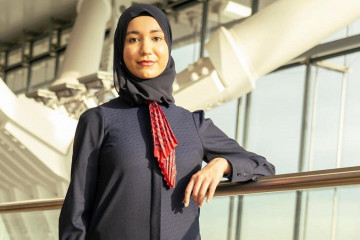

With a flying start for the New Year, British Airways launched its bold new collection of progressive and inclusive uniforms in an effort to update its stiff corporate identity.
The new uniform aims to represent "the very best of modern Britain'', which includes options for a “modern jumpsuit" or a tunic and hijab designed by British-Ghanaian fashion designer, Ozwald Boateng OBE.
Boateng had shadowed airport staff in developing the new uniform and said one of his main aims for the airline staff was to create “something that inspired and empowered them, encouraged them to conduct their roles with pride and most importantly to ensure that they felt seen and heard.”
Boateng posted on Instagram: “Creating a fresh narrative of change and transcendence”, but was met with criticism about the quality and practicality of the new uniform.
|
|
One Instagram user, Isabella Pais, commented: “It’s unflattering, dated, and impractical”, while another, Ciara Davis, said: “I think at least 90% of the female community at BA are dreading wearing any of these pieces.”
Some Twitter users also reacted negatively. One user wrote: “Sorry but it looks awful. All of it. Looks like cheap material and so unflattering” and another said: “The worst part about the whole thing is the scarf/tie thing. Really doesn’t scream anything BA or quality!"
One employee commented: “It’s absolutely impractical for our job on the aircraft.”
Those in favour of the new hijab British Airways uniform with a dapper scarf include Philanthropist and Entrepreneur, Farhiya Abass, who said: “Love the new British Airways’ cabin crew uniform which now includes a hijab option,” while Sport Inclusivity Consultant & Adidas Ambassador, Asma Elbadawi, said: “British Airways’ new uniform is a step in allowing Muslim women to feel more included and the hijab normalised and I’m here for it.”
Prior to the introduction of the new uniform, Muslim women were excluded from becoming part of the BA cabin crew and could only apply for flight attendant jobs with Islamic airlines where hijabs have always been accepted as part of the uniform, such as Oman Air, Emirates, Gulf Air, Saudia and Nasjet, for example.
However, this change will widen job opportunities for Muslim women and enable BA to tap into a wider pool of talent. Air Atlanta Icelandic has been ahead of the game for years and has become the largest Hajj and Umrah wet-lease operator in the world, transporting over 1.5 million pilgrims annually, meaning that hijab-wearing cabin crew are welcome.
Nevertheless, airlines have to consider safety when enforcing dress regulations, meaning that face coverings (niqabs and burqas) are still disallowed.
In 2021, when Iman Sayed decided to wear the Hijab and became Canada’s first Hijab wearing flight attendant, she doubted she would have been hired had she started her career wearing the Hijab.
Imam said: “I didn’t realise how much there wasn’t a big representation of us, of Muslim women.”
British Airways received feedback from their staff regarding the uniform and worked on the project for five years.
Enabling observant Muslims to be their authentic selves without compromising their dress code provides access and opportunities to a long-excluded talent group.
In a nation that boasts its inclusivity and attempts to drive out discrimination, other airlines should follow BA’s example and modify their uniforms to enable Muslim women to become valuable members of their flight teams.
"The worldwide halal market is expected to reach 9.71 trillion dollars by 2025"
When passengers see “people like me” they feel welcomed, as it creates a sense of belonging and builds loyalty. The Muslim economy is growing daily in Britain, Europe and across the world – it makes good business sense to be inclusive because diversity pays dividends. The 2019 State of the Global Islamic Economy Report estimated that there would be a 70% increase in Muslims by 2060, with three billion Muslims across the world.
The rapid increase of Muslim consumers is a driving force behind the halal industry. Adroit Market Research predicts that the worldwide halal market is expected to reach 9.71 trillion dollars by 2025.
For airlines aiming to lead the way, it’s a no-brainer to capitalise on the halal growth market.
Cabin crew are the public face of any airline to the world and reflect the global community builds, so one way of reflecting consumers is a diverse workforce through the offer of vibrant uniform options.
Airline uniforms incorporate distinct features of where they come from and of the nations they represent, including their national dress, like the sarong kebaya worn by the female staff of Singapore Airlines, designed by Pierre Balmain in 1968 and wincingly known as the “Singapore Girl.”
Airlines like Bangladesh Biman female staff wear saris representing the country’s national dress.
In keeping with British Airways' distinguished and celebrated history, the colours aren’t bright but stiff and sturdy – practical to get the job done.
Many Muslim women are chuffed to bits with the new hijab option and bravo to British Airways – we also know there is a very vibrant Britishness about the new uniform.
Rabina Khan is a former Councillor and Special Adviser. She is a London-based writer, and an Aziz Foundation Scholar and also works for a national charity empowering girls and women.
Follow her on Twitter: @RabinaKhan






